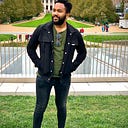Surviving through the Night in a World of Policing
Imagine waking up at 1am in the morning to aggravated yelling of “stop moving or I will shoot you in your fucking head” repeated over and over again as a threat with an increasing determination. On November 15th, that is exactly what I woke up to as officers surrounded and berated a handcuffed black man just outside of my apartment, threatening to take his life while he stood outside in 25 degree weather, most likely petrified in fear. I anxiously recorded what I predicted at the time would have been a man’s execution in the early hours of the morning. In situations like this, innocence or guilt matters little; in the moment, the only thought that consumed my mind was whether or not he would unjustly lose his life. Eventually more police cars, 7 in total (including a police van) flooded the area, all to stop the “threat” of a single handcuffed individual. The minutes passed by as the mood shifted from a palatable tension in the air to a more procedural and even jovial mood as officers recounted with laughs how terrified their suspect looked and how he tried to escape to no avail in the slippery conditions still present from snow earlier in the week. Finally after an hour, they left, but their presence still remained in the thoughts and questions that raced through my head.
As I talked on the phone to a friend, he reminded me that as a black man in America, walking away alive from encounters with the police, especially at night is a small win in of itself. However, on a fundamental level, what does it mean to be safe, to feel safe in your own home when you can be mere feet from violence delivered with impunity against somebody who looked just like you, who shares the same skin color like you, someone who in those fleeting moments you identified with in a deeply personal and visceral way as you prayed the police wouldn’t take their life away?
I live in the heavily policed DeBaliviere neighborhood in a region with a highly militarized police force. The police presence has been normalized to the point where it is unusual to not see a police car patrolling or the familiar red and blue lights not a stone’s throw away at any given moment. The police claim they “protect and serve” by patrolling, but too often their presence is inherently a danger to those they claim to protect. To be black in this heavily policed state is to be labeled guilty on some level regardless the circumstances.
Not unlike the rest of the region, Washington University also unleashes this instability against its own community. Currently, the Washington University Police Department (WUPD) has a jurisdiction ranging from Clayton to the Central West End and University City north of Delmar Blvd down to Forest Park Southeast. With recent visibility focused on crimes committed in the vicinity where students live, the university response has been to increase policing and patrols as a “deterrent” to crime, but what is the impact to black residents and students alike who are already viewed with suspicion?
I remember my first ABS meeting at Washington University and how quickly we were warned about WUPD. One of the first pieces of advice I was given by members of ABS as well as fellow Ervin Scholars was to always walk around on and off-campus at night with a backpack in case WUPD were to mistake you as “trespassing or not belonging to the campus community”. When on Delmar Blvd at night, we were instructed to reach out and get a ride back home from an upperclassman, because the police were so virulently racist. I wrote before about my own experiences with WUPD, how one summer evening in 2014, I was followed by a WUPD police officer as I was walking from the Loop to the Overpass and how in that moment, I felt a visceral fear that the officer was going to confront me and whether or not I could tell if the officer had his hands on his weapon.
While the social context may have shifted, many dynamics remain the same. Nobody should ever feel unsafe walking down the street at night or in their homes, but why does this provide justification to push policies that inherently subordinate the need of safety for a significant part of our community by increasing patrolling to cater to a class of students? How long will it be before black and brown students will be placed in a situation like me, staring out of the window at 1am praying to God that the militarized university police, a police force with AR-15 semiautomatic rifles in their cars do not execute a handcuffed person after threatening to do so? Or worse, how long until a student is caught in their crosshairs and is like the person in my story, handcuffed and paralyzed with fear, knowing that their survival depends on empathy from someone who serves an institution descended from slave patrols?
